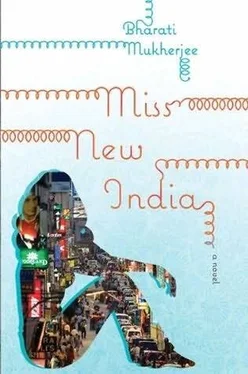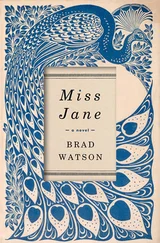And so it went, with variations, night after night in the Bose household. But during the day, with Mr. Bose away in the office, Mrs. Bose hatched new plans. "In six months," her mother practically chirped, "you will be a married woman." She reeled off common Kayastha-caste surnames: a Mrs. Das, Mrs. Ghosh, Mrs. Dasgupta, Mrs. Mitter, Mrs. De, Mrs. Sen, Mrs. Sinha, Mrs. Bhowmick. "You will have a new house in a new city with a new family of brothers, sisters, and parents. You'll become a whole different person." As appealing as a new family might sound in the abstract, it surely meant future entombment.
Mr. Bose didn't have access to a computer at work and did not know how to use the Internet. He asked around for help, for anyone's son or daughter who might have a computer to come to his rescue, but the computers were in the college and the college was on summer break until the monsoons started. Neighbors suggested names, everyone recommended Bengaliweddings.com as the most reliable website with the widest distribution. There was a boy in the neighborhood, Nirmal Gupta, called Sure-Bet-IIT Gupta, a classmate of Anjali's and a genius with computers. Go to Nirmal, the Boses were told. Truly, it takes a village to marry off a daughter. Mr. Bose sent the word to distant relatives in Kolkata and alerted managerial-level colleagues at work that he was on the lookout for a jamai for his number-two daughter.
All of the adult mysteries were about to unfold, her mother told Anjali. One's secret fate, hidden behind the stars, would suddenly burst forth like a seed in fertile soil, nurtured by sun and rain. The One True Mate whose destiny had been waiting for this glorious conjunction since the beginning of time would materialize in all his worshipful strength and beauty.
This was parent-talk from the other side of the great modern divide. Mrs. Bose was silent on what Sonali, in her first month as wife, saucily confided to Anjali about men's "animal nature." The sisters had giggled over Sonali's graphic descriptions of marriage-bed drama. Angie doubted that her father, even in his youth, had been endowed with animal nature. Her mother could not possibly have ever expected, let alone experienced, conjugal delirium with her father. Angie wished she could ask her mother what shape her dreams of married life had taken before Mr. Bose had become her bridegroom. Her mother had married at seventeen. The senior Mrs. Bose, her mother-in-law, did not want a vain, ambitious, educated woman in the family, so she had demanded that the girl drop out of school just a month before graduation. Anjali's mother had hoarded that grievance, polished and buffed it to radiance over the years, and brought it out to great effect during domestic squabbles. For her father, marriage was a sacred duty; for her mother it was an accumulation of insults and an avenging of hurts.
But for Sonali, as Sonali explained to Anjali on their rare secret reunions, successful marrying off of one's offspring was neither an art nor a science. Horoscopes might correctly calculate astral compatibility. But marital happiness? That was in the hands of fate.
The volume of response to the new ads was overwhelming. Along with thirty responses from India, three letters arrived from Dubai, two from Kenya, one from Canada, and one from Mauritius: a village of Bengali bachelors strung around the world, working their computers. The long list selected by Mr. Bose was so promising that Mrs. Bose, in high spirits, secreted a slim wad of rupees and instructed Anjali to go to Calendar Girl in Pinky Mahal. "Best to stay prepared for short-notice interviews," she explained. "They use bleaching creams and whatnot that last for weeks."
While her mother prayed to the household gods, Mr. Bose shifted into high gear, even reading English ads and reopening old school contacts. ("Remember the Dasguptas in Ranchi? They had a boy, I'm sure. Anil, isn't it? I will write Deepak Dasgupta and ask after Anil…") and so on it went, letters sent out, responses coming back… the promising, the disappointing. Deepak Dasgupta wrote back, "Our boy Anil is finishing MBA in Maryland-USA. I regret to say he intends to make his own match in the so-called modern manner."
Which means he's already living with an American girl, thought Angie.
"I will spread the word in Ranchi about your lovely daughter whose picture is very simple and pleasing…"
The mailman too began to take an interest as he left off envelopes thick with bios and photos. "Word is getting around, Big Sister," he would say with an ingratiating grin as he handed Mrs. Bose manila envelopes with foreign postage. "God willing, we'll be celebrating with sweetmeats soon."
"That man is just interested in getting his baksheesh for delivering the right application," Mr. Bose complained. "These people want something for nothing."
All of her life, Anjali had been made aware of the ways in which a prospective bride could lose her footing. In the Snakes and Ladders game of marital negotiation, a girl has a hundred ways of disappointing, then it's tumble, tumble down a hole or worse, like Alice in Wonderland. Leaving aside questions of incompatible horoscopes, rejected dowry proffers, ancestral scandals, and caste irregularities, a girl could lose points on the desirability scale for being too short or too tall, too dark or too fair, too buxom or too flatty-flatty, with eyes too small or too light, hair too frizzy, a personal manner too outspoken or too repressed, school grades too high (potentially showing too much personal ambition) or too low (indicating a potential hazard as breeding stock). Of course, a decent dowry can always smooth the edges. Needless to say, her father could not provide it.
Angie found 99 percent of boys simply unappealing. The idea of sleeping in their beds, bearing their children, cooking for them, sitting across from them and watching them eat and burp, and listening to their voices and opinions for a lifetime put the idea of marriage in a category with a life sentence on the Andaman Islands. Thirty boys rejected; none even progressed to the interview stage. "I will decide who is good," Mr. Bose now threatened. "I've left you too much in charge. You are abusing a privilege that was never yours to begin with."
She rejected the first batch of short-listed candidates on the basis of their photos alone. "Look at those shifty eyes!" she'd say. Or "He's fat as an elephant!" Or "Eeesh, what happened to his teeth? He's wearing dentures." Bald spots, double chins, hairy arms. She automatically rejected boys with fancy mustaches and sideburns, those striving for coolness in blue jeans and sunglasses, and those who appeared too goody-goody, too pretentious or too homespun. No pictures, please, with mommy/daddy or grandparents or household pets. No Man-of-the-People shots with servants. She detested foreign settings ("Here is a snap I have dug up from base of Eiffel Tower"…or "Buckingham Palace"…or "Statue of Liberty"…or "Gate of Forbidden City"…). Those were the easy ones. But if a boy with outstanding prospects or handsomeness actually turned up, she'd make a show of serious scrutiny before complaining, "He thinks too well of himself, he's posing like a fashion model." Or "A boy like that-if he's so perfect, why couldn't they find him a rich girl in Kolkata?"
"It's your fault." Mrs. Bose charged her husband with this failure, reminding him of all the trouble with "your other daughter," reminding him of all of Sonalis prideful rejections of acceptable boys from reasonably good families. Sonali had imagined their soft, round, bhad-bhada faces aging into double chins, their bristly eyebrows that could only grow untamed ("I'm sure he's already clipping his ear hair!" Sonali had complained). And look at what all her rejections finally got her-a man too handsome for his own good, a man with glorious prospects and no accomplishments, a man who stole her dowry gold and made a mockery of marriage.
Читать дальше












